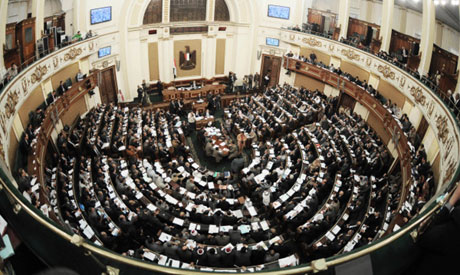
A general view of the Egyptian parliament during a working session in Cairo, Egypt (Photo: AP)
T'azeez Al-Democratiyya (Enhancing Democracy) by Dr. Yousri Al-Azabawi, Alternatives Series - Al-Ahram Center for Strategic Studies, Cairo, 2014. pp.26
The Alternatives Series is a political studies quarterly concerned with the current issues that preoccupy public opinion. For instance, it has published a study on the problems of achieving national reconciliation after revolutions, reforming the police and Al-Azhar, democratisation and other studies which discuss strongly raised issues in the political arena.
In its latest issue, it discusses the possible paths for the role of the parliament in the democratisation process, especially after presenting the new electoral law and electoral constituencies' law. In the very first lines of his study, the author points out that the legislative elections, represented in the House of Representatives, is the last step in the "Future Map" which was announced in the 3 July 2013 statement after overthrowing the Muslim Brotherhood regime.
The author also points out that preparing a law for electing members of parliament occurs at exceptional circumstances where the Arab region witnesses what may be considered a second world war against terrorism which is posing a menace to Egyptian national security, in the light of the Takfiri and Jihadist groups in Sinai. At the same time, electing this parliament coincides with extremely serious circumstances in which the region is disintegrated and reassembled without a resistance from its rulers or peoples.
As for the study, it discusses the organisational framework for the new House of Representatives through analysing its powers in the light of the 2014 constitution and the regulating laws for electing its members and the political forces' stand towards it with a special focus on the electoral law due to its controversy among political forces. It analyses the probable alliances between political forces, not only during the elections but the possibility of its continuity after the elections as well. What's more important is how this will influence the nature of the relationship between the president and executive power in general. The study concludes by presenting six necessary requirements for the House of Representatives to play a role in enhancing the democratisation process in the next stage.
Perhaps it is important here to display the study's viewpoint regarding the main six alliances during elections. It is as follows: the Egyptian Wafd Alliance comprising civil parties such as Al-Wafd, the Egyptian Social Democratic Party and the Reformation and Development Party and other small parties. It is the most famous and controversial in the public sphere.
The second alliance is the 25–30 Alliance comprising of a number of public figures such as Abdel-Halim Qandeel, Abdel-Hakim Abdel-Nasser and Shahinda Maqled and a number of the youths who participated in the January revolution and its second wave on 30 June. The third is the Transitional Justice Alliance comprising a number of leftist and Nasserite parties, then the Egyptian Front Alliance which supported Ahmed Shafiq in his presidential bid in 2012, and the Civil Democratic Alliance comprising some parties that supported the losing presidential candidate Hamdeen Sabahi, and finally Wasat, Misr Al-Qawia and Nahda Alliance which are all known to be parties with an Islamic point of reference.
Here, the study added four features for these alliances: first, rapid change, looseness in the formation and the number of those belonging to the alliance. Second, the elitism which characterises some alliances where it is linked up with personalities and individuals rather than objectives. Third, the attempt of some alliances to exploit the name of President Abdel-Fattah El-Sisi through presenting itself as his political backbone, despite the fact that he did ask the parties only to join forces and work for the sake of Egypt. Fourth, the exclusionist or marginalising nature of these alliances i.e. the objective of it is to beat Nour Party or the Brotherhood or Mubarak's regime remnants and not to allow them to win any seats in the parliament and finally, the political one-upmanship and counter one-upmanship by some alliances.
On the other hand, the study points out that the composition of the new House of Representative will be contested between the parties which inherited the disbanded National Democratic Party and the parties with an Islamic point of reference because of having financial resources previous and election experience then the parties formed after the revolution although it is still elitist and lacks popular base. The study also anticipates that the next parliament's composition will be troubled and captive to electoral deals, bargains and alliances especially after the civil current's failure in forming an alliance to unite all the civil parties and running the elections with a unified list.
Lastly, the study concludes that in order to enhance the democratisation process in Egypt, it is important to activate the role of the next House of Representatives towards the following six issues:
The parliament's should stick firmly to its constitutional powers, achieving transitional justice and national reconciliation, the attempt to create national consensus, combating corruption and achieving fairness and transparency, activating the role of parties and activating the citizens' capabilities and suggestions inside the parliament.
In order that the aforementioned six issues be activated is based on the study's presumption that an undistorted parliament will be elected and it will have a degree of homogeneousness, a parliament that will have its democratic traditions and practices which the next parliament lacks according to the current indicators.
Short link: